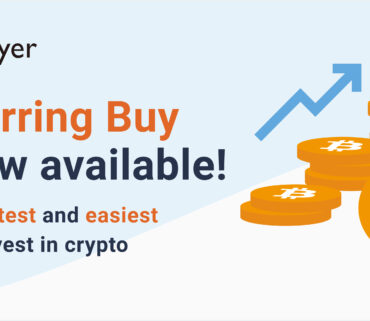
Is Bitcoin safe?

To discuss the safety of Bitcoin requires a strong understanding of what Bitcoin is. To provide a quick primer, Bitcoin is a type of cryptocurrency. Bitcoin was invented in 2009 by an anonymous entity going by the name of “Satoshi Nakamoto.” It employs peer-to-peer networking and a blockchain – a decentralized data storage methodology that distributes a database of information onto all of the computers of the users utilizing it. Wallets are used to store bitcoin, and bitcoin is a virtual currency accepted worldwide to pay for many products and services. Here is our full explanation of what Bitcoin is.
To understand if Bitcoin is safe we’ll need to examine how bitcoin is stored, purchased, sold, and transferred.
The safety of transferring and storing bitcoin.
Bitcoin can be obtained through virtual currency exchanges – like bitFlyer’s virtual currency exchange. These exchanges allow users to buy and sell bitcoin.
The key to bitcoin’s safety is the mechanism by which information is stored and transferred; that mechanism is called blockchain.
Two main factors are key in securing data stored using blockchain:
- The data is stored in identical databases across the network of miners that verify the data.
- The data cannot be deleted or edited. Changes to the data can only occur through additions to the blockchain.
1. Blockchain: A distributed blockchain database.
In a traditional database setup, a server stores information about its users and their activity in a centralized location governed by a centralized authority. Data in this type of database is usually manipulated by a single account with permission to add, edit, and delete information throughout the database.
With blockchain, information is stored with the users and miners. The data that is private is encrypted, and authority to view or modify this data is only provided to those with the right permissions. When a change does occur, every computer running the same database understands who has rights to edit what data.
For example; my home address could only be viewed and modified by me (the owner). When I make a change to my database, it then has to be accepted by all the other databases on everyone else’s computers. The other databases know the rule that I’m the only one who can edit my address, and this change is accepted. If someone else tries to change my address, all of the databases will not accept the change. This simple example shows the permissions management abilities of blockchain in comparison to a traditional database.
2. Blockchain: Manipulation through Addition.
In a traditional database, data can be updated or deleted from the same record from which it was created. If I change my phone number, a record of what the value was prior to the change is not usually kept.
Data in a distributed blockchain database cannot be deleted or edited. Changes to it can only be accomplished through additional updates or new transactions. Those transactions (and all data) are stored in “blocks.” If I updated my address a new data block is created to store that change. This is why blockchain is often referred to as a ledger.
For example: When I updated my address, it was the third time in the last two years. With blockchain, we’re able to view the changes over time (like a ledger). In a traditional database, a history of such a change is more than likely going to be lost. By default, a traditional database will not keep a history or audit log for this type of information.
A change in address might not seem like the type of information that warrants historical reflection. However, imagine if this were a bank balance or financial transaction. Storing information through additional blocks instead of altering the data in the original record is extremely valuable.
Blockchain is vital to the safety of bitcoin.
Blockchain was created for Bitcoin. Consensus based permissions and alterations only through additions are two key aspects that make bitcoin safe.
The safety of a bitcoin wallet.

Like any physical currency, bitcoin is also kept in a wallet (or in an account on a virtual exchange). And just the like physical world, a wallet can be stolen.
Storing bitcoin online in a digital wallet.
Bitcoin can be stored online in a digital wallet, your computer, smartphone, or a USB device can act as a wallet. Additionally bitcoin can be stored in an account with a virtual exchange. If in an exchange, password selection is key, and following the latest digital identity guidelines for password selection is a great way to ensure a password is secure. Make sure not to reuse passwords.
Phishing attempts are also a large threat to account information. Any email, alert, link, or notification should be double checked for authenticity. Check where an email originated (The display name does not count, check the actual email address, the sending server, and any authentication provided). Check where the link on a notification might take you (right click or hold your finger on the link to view its destination). Phishing attempts look like legitimate contact requests, always double check before proceeding.
Storing bitcoin offline in a cold wallet.
Offline storage of bitcoin is also possible. Also known as “cold storage” or a “cold wallet,” this is a preferred mechanism of storage for many people due to its security.
Hardware wallets are a special type of storage where private keys are stored on the device’s hardware itself, protecting it from any interactivity through software (viruses, programs, etc.).
The Verdict: How safe is bitcoin?
Bitcoin and the technology behind Bitcoin are safe. Wallets and the storing of bitcoin are as safe as a user’s diligence to make them so.
It is also extremely important to select a virtual currency exchange that places user security as the highest priority when acquiring bitcoin. Select an exchange that has a history of successful information security management and proper licensing to operate throughout most of the United States.
The safe, secure, and best Bitcoin exchange
User safety and security is the highest priority with bitFlyer’s virtual currency exchange. The largest bitcoin exchange in Japan is now available in the United States.
Find out more about bitFlyer’s virtual currency exchange.





